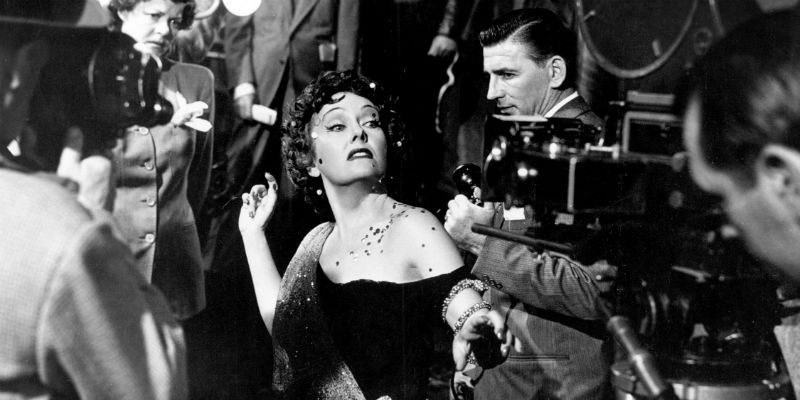Crime cinema is not known for its long-winded monologues. Quite the contrary: snappy dialogue and moody interludes, with no words spoken at all, have characterized the various forms of the genre since its inception. But every once in while, we get to the point in a crime film where someone’s got to defend something—maybe that’s their crimes, or their ethical dilemmas, or their quest for justice—and that’s where the monologue gets its due.
Noir films, when they do have speeches, tend to aim their monologues in one of two directions—either calling out hypocrisy, or making the case for justice. This mirrors the general ambivalence of the genre: either the world is terrible, or the world deserves better, but you’d be hard-pressed to find an opinion between those extremes. The one thing all these monologues share in common is that either explain or justify that which is difficult to explain or justify. In other words, the art of the film noir monologue is the art of the excuse.
Below, you’ll find a list of what I consider to be the 20 best speeches in crime cinema, from the golden age of film noir up to the present day. In this humble attempt to assemble the best speeches in crime fiction, the old adage that villains get the best lines is once again proven (or, perhaps, I just relate to those lines more). Apologies for the lack of international picks, and please leave a comment with any suggestions for a follow-up list of the best speeches in international crime cinema.
___________________________________
1930s
___________________________________
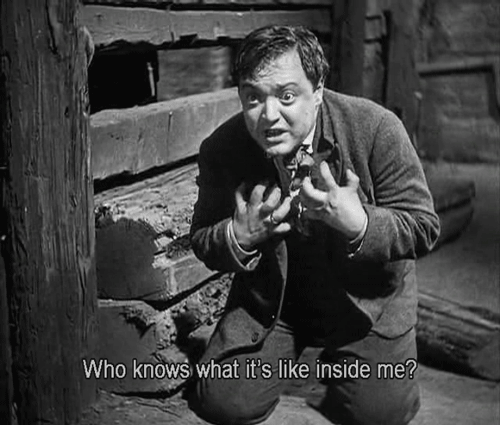
M (1931), directed by Fritz Lang, written by Fritz Lang and Thea von Harbou
The “I Can’t Help It” Speech
“I can’t help what I do! I can’t help it, I can’t…What do you know about it? Who are you anyway? Who are you? Criminals? Are you proud of yourselves? Proud of breaking safes or cheating at cards? Things you could just as well keep your fingers off. You wouldn’t need to do all that if you’d learn a proper trade or if you’d work. If you weren’t a bunch of lazy bastards. But I… I can’t help myself! I have no control over this, this evil thing inside of me, the fire, the voices, the torment! … It’s there all the time, driving me out to wander the streets, following me, silently, but I can feel it there. It’s me, pursuing myself! I want to escape, to escape from myself! But it’s impossible. I can’t escape, I have to obey it. I have to run, run… endless streets. I want to escape, to get away! And I’m pursued by ghosts. Ghosts of mothers and of those children… they never leave me. They are always there… always, always, always!, except when I do it, when I… Then I can’t remember anything. And afterwards I see those posters and read what I’ve done, and read, and read… did I do that? But I can’t remember anything about it! But who will believe me? Who knows what it’s like to be me? How I’m forced to act… how I must, must… don’t want to, must! Don’t want to, but must! And then a voice screams! I can’t bear to hear it! I can’t go on! I can’t… I can’t…”—Hans Beckert, played by Peter Lorre
___________________________________
1940s
___________________________________
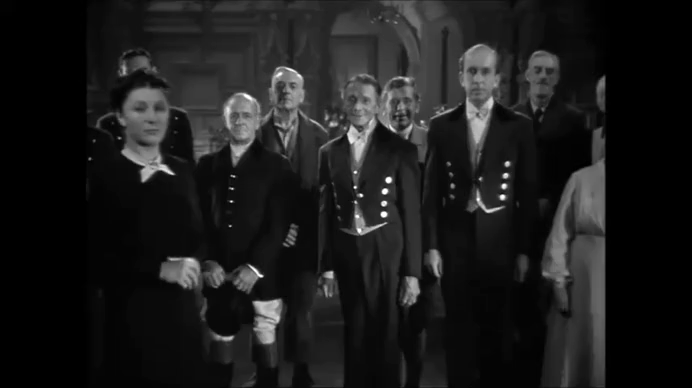
Rebecca (1940) dir. by Alfred Hitchcock, screenplay by Robert E. Sherwood and Joan Harrison, adapted by Philip MacDonald and Michael Hogan, from the novel by Daphne du Maurier
The “Manderley” Speech
“Last night, I dreamt I went to Manderley again. It seemed to me I stood by the iron gate leading to the drive, and for a while I could not enter for the way was barred to me. Then, like all dreamers, I was possessed of a sudden with supernatural powers and passed like a spirit through the barrier before me. The drive wound away in front of me, twisting and turning as it had always done. But as I advanced, I was aware that a change had come upon it. Nature had come into her own again, and little by little had encroached upon the drive with long tenacious fingers, on and on while the poor thread that had once been our drive. And finally, there was Manderley—Manderley—secretive and silent. Time could not mar the perfect symmetry of those walls. Moonlight can play odd tricks upon the fancy, and suddenly it seemed to me that light came from the windows. And then a cloud came upon the moon and hovered an instant like a dark hand before a face. The illusion went with it. I looked upon a desolate shell, with no whisper of the past about its staring walls. We can never go back to Manderley again. That much is certain. But sometimes, in my dreams, I do go back to the strange days of my life which began for me in the south of France…”—The Second Mrs. De Winter, played by Joan Fontaine
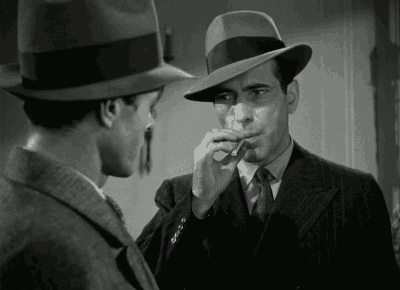
The Maltese Falcon (1942), dir. and adapted by John Huston, from the novel by Dashiell Hammett
The “When a Man’s Partner is Killed, He’s Supposed to Do Something About It” Speech
“When a man’s partner is killed, he’s supposed to do something about it. It doesn’t make any difference what you thought of him. He was your partner and you’re supposed to do something about it. And it happens we’re in the detective business. Well, when one of your organization gets killed, it’s—it’s bad business to let the killer get away with it, bad all around, bad for every detective everywhere.”—Sam Spade, played by Humphrey Bogart
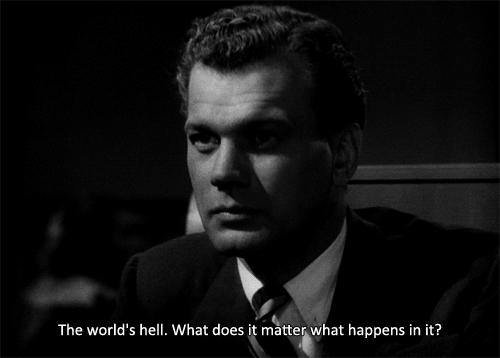
Shadow of a Doubt (1943), dir. by Alfred Hitchcock, written by Thornton Wilder, Sally Benson, and Alma Reville
“The World’s A Hell. What Does it Matter What Happens In It?” Speech
“You think you know something, don’t you? You think you’re the clever little girl that knows something. There’s so much you don’t know. So much. What do you know, really? You’re just an ordinary little girl living in an ordinary little town. You wake up every morning of your life and you know perfectly well that there’s nothing in the world to trouble you. You go through your ordinary little day and at night you sleep your untroubled, ordinary little sleep filled with peaceful, stupid dreams. And I brought you nightmares! Or did I, or was it a silly inexpert little lie? You live in a dream. You’re a sleepwalker, blind. How do you know what the world is like? Do you know the world is a foul sty? Do you know if you rip the fronts off houses you’d find swine? The world’s a hell. What does it matter what happens in it? Wake up, Charlie! Use your wits. Learn something.”—Charles Oakley, played by Joseph Cotten

To Have and Have Not (1944), dir. by Howard Hawks, written by William Faulkner
The “Put Your Lips Together and Blow” Speech
“Who was the girl, Steve?… The one that left you with such a high opinion of women? She must have been quite a gal. You think I lied to you about this, don’t you? Well, it just happens there’s thirty-odd dollars here. Not enough for boat fare, or any other kind of fare. Just enough for me to say ‘no’ if I feel like it, and you can have it if you want it… You wouldn’t take anything from anybody would you?… You know Steve, you’re not very hard to figure. Only at times. Sometimes I know exactly what you’re going to say. Most of the time. The other times, the other times you’re just a stinker.
“It’s even better when you help…. Uh, sure you won’t change your mind about this?… This belongs to me, and so do my lips, I don’t see any difference… Okay, you know you don’t have act with me, Steve. You don’t have to say anything, and you don’t have to do anything. Not with me. Oh, maybe just whistle. You remember how to whistle, don’t you? Just put your lips together… and blow.”—Marie “Slim” Browning, played by Lauren Bacall
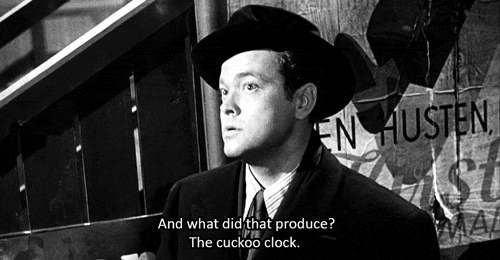
The Third Man (1949), dir. by Carol Reed, written by Graham Greene
The “Cuckoo Clock” Speech
“Holly, I’d like to cut you in, old man. There’s nobody left in Vienna I can really trust, and we’ve always done everything together. When you make up your mind, send me a message—I’ll meet you any place, any time, and when we do meet old man, it’s you I want to see, not the police. Remember that, won’t ya? Don’t be so gloomy.
After all it’s not that awful. You know what the fellow said—in Italy, for thirty years under the Borgias, they had warfare, terror, murder and bloodshed, but they produced Michelangelo, Leonardo da Vinci and the Renaissance. In Switzerland, they had brotherly love, they had five hundred years of democracy and peace—and what did that produce? The cuckoo clock. So long Holly.”—Harry Lime, played by Orson Welles
___________________________________
1950s
___________________________________
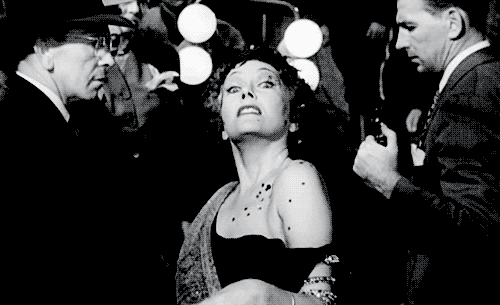
Sunset Boulevard (1950) dir. by Billy Wilder, written by Charles Brackett
The “I’m Ready for My Close-Up” Speech
“I just want to tell you all how happy I am to be back in the studio, making a picture again! You don’t know how much I’ve missed all of you. And I promise you I’ll never desert you again because after Salome we’ll make another picture and another picture. You see, this is my life! It always will be! There’s nothing else! Just us, the cameras, and those wonderful people out there in the dark!… All right, Mr. DeMille, I’m ready for my close-up.”—Norma Desmond, played by Gloria Swanson
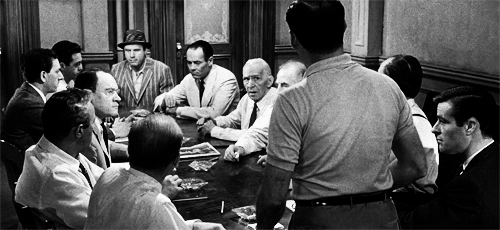
12 Angry Men (1957), dir. by Sydney Lumet, written by Reginald Rose
The Reasonable Doubt Speech
It’s always difficult to keep personal prejudice out of a thing like this. And wherever you run into it, prejudice always obscures the truth. I don’t really know what the truth is. I don’t suppose anybody will ever really know. Nine of us now seem to feel that the defendant is innocent, but we’re just gambling on probabilities—we may be wrong. We may be trying to let a guilty man go free, I don’t know. Nobody really can. But we have a reasonable doubt, and that’s something that’s very valuable in our system. No jury can declare a man guilty unless it’s SURE.—Juror #8

The Night of the Hunter (1955), dir. by Charles Laughton, adapted by James Agee from the novel by Davis Grubb
The “Little Story of Right Hand, Left Hand” Speech
“Ah, little lad, you’re staring at my fingers. Would you like me to tell you the little story of right hand, left hand, the story of good and evil?
H-A-T-E, it was with this left hand that old brother Cain struck the blow that laid his brother low. L-O-V-E, you see these fingers, dear hearts? These fingers have veins that run straight to the soul of man. The right hand, friends, the hand of love. Now watch, and I’ll show you the story of life. Those fingers, dear hearts, is always a-warring and a-tugging, one a-gin the other. Now watch ’em. Old brother left hand, left hand he’s a fighting, and it looks like love’s a goner. But wait a minute, wait a minute. Hot dog, love’s a winning. Yessirree. It’s love that’s won, and old left hand hate is down for the count.”—Reverend Harry Powell, played by Robert Mitchum
___________________________________
1960s
___________________________________

Psycho (1960), dir. by Alfred Hitchcock, adapted by Joseph Stefano from the novel by Robert Bloch
The “Why, She Wouldn’t Even Harm a Fly” Speech
“It’s sad when a mother has to speak the words that condemn her own son, but I couldn’t allow them to believe that I would commit murder. They’ll put him away now, as I should have years ago. He was always bad, and in the end he intended to tell them I killed those girls and that man, as if I could do anything except just sit and stare, like one of his stuffed birds.
Oh, they know I can’t even move a finger, and I won’t. I’ll just sit here and be quiet, just in case they do suspect me. They’re probably watching me. Well, let them. Let them see what kind of a person I am. I’m not even gonna swat that fly. I hope they are watching. They’ll see. They’ll see and they’ll know, and they’ll say, ‘Why, she wouldn’t even harm a fly.'”—Norman Bates, played by Anthony Perkins
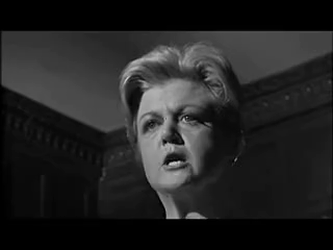
Manchurian Candidate (1962) dir. by John Frankenheimer, written by George Axelrod, from the novel by Richard Condon
The “Contemptuously Under-estimating Me” Speech
“I know you will never entirely comprehend this, Raymond, but you must believe I did not know it would be you. I served them. I fought for them. I’m on the point of winning for them the greatest foothold they would ever have in this country. And they paid me back by taking your soul away from you. I told them to build me an assassin. I wanted a killer from a world filled with killers and they chose you because they thought it would bind me closer to them. [She places the sides of his face in her outstretched hands.] But now, we have come almost to the end. One last step. And then when I take power, they will be pulled down and ground into dirt for what they did to you. And what they did in so contemptuously under-estimating me.”—Mrs. Eleanor Iselin, played by Angela Lansbury
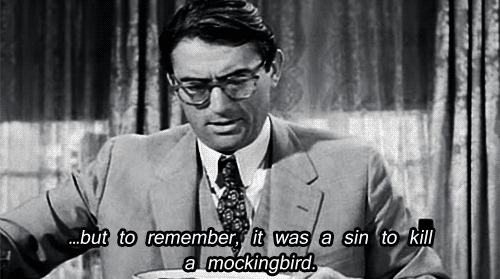
To Kill A Mockingbird (1962) dir. by Robert Mulligan, screenplay by Horton Foote, adapted from the novel by Harper Lee
The “Remember It Was a Sin to Kill a Mockingbird” Speech
“I remember when my daddy gave me that gun. He told me that I should never point it at anything in the house, and that he’d rather I’d shoot at tin cans in the backyard. But he said that sooner or later he supposed the temptation to go after birds would be too much, and that I could shoot all the blue jays I wanted, if I could hit ’em, but to remember it was a sin to kill a mockingbird.”—Atticus Finch, played by Gregory Peck
___________________________________
1970s
___________________________________
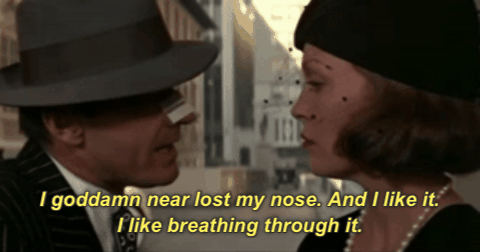
Chinatown (1974), dir. by Roman Polanski, written by Robert Towne
The “I Goddamned Near Lost My Nose” Speech
“OK, go home, but in case you’re interested, your husband was murdered. Somebody’s been dumping thousands of tons of water from the city’s reservoirs and we’re supposed to be in the middle of a drought. He found out about it and he was killed. There’s a waterlogged drunk in the morgue, involuntary manslaughter if anybody wants to take the trouble—which they don’t. It seems like half the city is trying to cover it all up, which is fine by me. But Mrs. Mulwray, I goddamned near lost my nose. And I like it. I like breathing through it. And I still think that you’re hiding something.”—Jake Gittes, played by Jack Nicholson
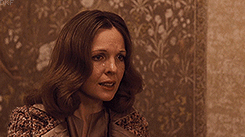
The Godfather Part II (1974), dir. by Francis Ford Coppola, screenplay by Coppola and Mario Puzo from the book by Mario Puzo
The “This Must All End” Speech
“Oh, oh Michael. Michael you are blind. It wasn’t a miscarriage—it was an abortion. An abortion Michael. Just like our marriage is an abortion. Something that’s unholy and evil. I didn’t want your son Michael—I wouldn’t bring another one of you sons into this world. It was an abortion Michael. It was a son Michael, a son and I had it killed—because this must all end.
[Michael’s eyes begin to bulge.]
I know now that it’s over now—I knew it then—there would be no way Michael—no way you could ever forgive me. Not with this Sicilian thing that’s been going on for 2000 years—.”—Kay Adams-Corleone, played by Diane Keaton
___________________________________
1980s
___________________________________
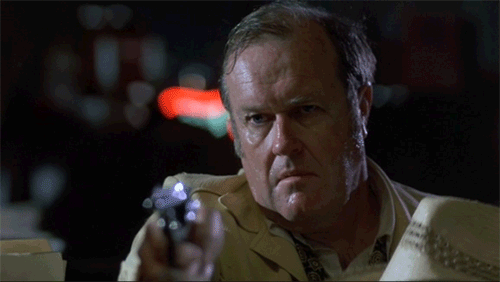
Blood Simple (1984), written, dir. and edited by Joel and Ethan Coen
“The World is Full of Complainers” Speech
“The world is full of complainers. But the fact is, nothing comes with a guarantee. I don’t care if you’re the Pope of Rome, President of the United States, or even Man of the Year—something can always go wrong. And go ahead, complain, tell your problems to your neighbor, ask for help—watch him fly. Now in Russia, they got it mapped out so that everyone pulls for everyone else—that’s the theory, anyway. But what I know about is Texas…And down here… you’re on your own.”—Loren Visser, played by M. Emmett Walsh
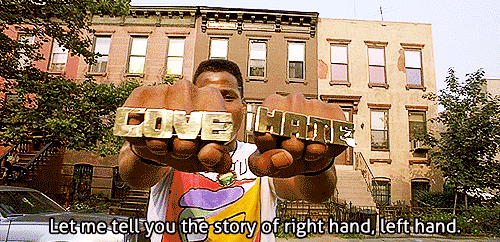
Do the Right Thing (1989) written and dir. by Spike Lee
The “Right Hand, Left Hand” Speech
“Let me tell you the story of Right Hand, Left Hand. It’s a tale of good and evil. Hate: it was with this hand that Cane iced his brother. Love: these five fingers, they go straight to the soul of man. The right hand: the hand of love. The story of life is this: static. One hand is always fighting the other hand, and the left hand is kicking much ass. I mean, it looks like the right hand, Love, is finished. But hold on, stop the presses, the right hand is coming back. Yeah, he got the left hand on the ropes, now, that’s right. Yea, boom, it’s a devastating right and Hate is hurt, he’s down. Ooh! Ooh! Left-Hand Hate KOed by Love. If I love you, I love you. But if I hate you …”—Radio Raheem, played by Bill Nunn
___________________________________
1990s
___________________________________

American Psycho (1991), dir. and adapted by Mary Harron, from the novel by Bret Easton Ellis
The “I Am Simply Not There” Speech
“I live in the American Gardens Building on West 81st Street on the 11th floor. My name is Patrick Bateman. I’m 27 years old. I believe in taking care of myself, and a balanced diet and a rigorous exercise routine. In the morning, if my face is a little puffy, I’ll put on an ice pack while doing my stomach crunches. I can do a thousand now. After I remove the ice pack I use a deep pore cleanser lotion. In the shower I use a water activated gel cleanser, then a honey almond body scrub, and on the face an exfoliating gel scrub. Then I apply an herb-mint facial masque which I leave on for 10 minutes while I prepare the rest of my routine. I always use an after shave lotion with little or no alcohol, because alcohol dries your face out and makes you look older. Then moisturizer, then an anti-aging eye balm followed by a final moisturizing protective lotion. There is an idea of a Patrick Bateman. Some kind of abstraction. But there is no real me. Only an entity. Something illusory. And though I can hide my cold gaze, and you can shake my hand and feel flesh gripping yours, and maybe you can even sense our lifestyles are probably comparable, I simply am not there.:—Patrick Bateman, as played by Christian Bale

The Crying Game (1992), written and dir. by Neil Jordan
The Scorpion and the Frog Speech
‘Two types, Fergus. The scorpion and the frog. Ever heard of them?
[Fergus says nothing.]
Scorpion wants to cross a river, but he can’t swim. Goes to the frog, who can, and asks for a ride. Frog says, ‘If I give you a ride on my back, you’ll go and sting me.’ Scorpion replies, ‘It would not be in my interest to sting you since as I’ll be on your back we both would drown.’ Frog thinks about this logic for a while and accepts the deal. Takes the scorpion on his back. Braves the waters. Halfway over feels a burning spear in his side and realizes the scorpion has stung him after all. And as they both sink beneath the waves the frog cries out, ‘Why did you sting me, Mr. Scorpion, for now we both will drown?’ Scorpion replies, ‘I can’t help it, it’s in my nature.'”—Jody, played by Forrest Whitaker

Pulp Fiction (1994) written and dir. by Quentin Tarantino
The “Great Vengeance and Furious Anger” Speech
“There’s a passage I got memorized. Ezekiel 25:17. “The path of the righteous man is beset on all sides by the inequities of the selfish and the tyranny of evil men. Blessed is he who, in the name of charity and good will, shepherds the weak through the valley of the darkness, for he is truly his brother’s keeper and the finder of lost children. And I will strike down upon thee with great vengeance and furious anger those who attempt to poison and destroy My brothers. And you will know I am the Lord when I lay My vengeance upon you.” Now… I been sayin’ that shit for years. And if you ever heard it, that meant your ass. You’d be dead right now. I never gave much thought to what it meant. I just thought it was a cold-blooded thing to say to a motherfucker before I popped a cap in his ass. But I saw some shit this mornin’ made me think twice. See, now I’m thinking: maybe it means you’re the evil man. And I’m the righteous man. And Mr. 9mm here… he’s the shepherd protecting my righteous ass in the valley of darkness. Or it could mean you’re the righteous man and I’m the shepherd and it’s the world that’s evil and selfish. And I’d like that. But that shit ain’t the truth. The truth is you’re the weak. And I’m the tyranny of evil men. But I’m tryin’, Ringo. I’m tryin’ real hard to be the shepherd.”—Jules Winnfield, played by Samuel L. Jackson
___________________________________
2010s
___________________________________
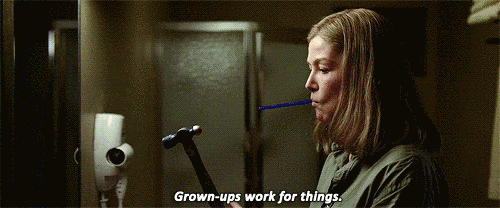
Gone Girl (2014), dir. by David Fincher, adapted by Gillian Flynn from her novel of the same name
The “Cool Girl” Speech
“Nick and Amy will be gone, but then we never really existed. Nick loved a girl I was pretending to be. “Cool girl”. Men always use that, don’t they? As their defining compliment: “She’s a cool girl”. Cool girl is hot. Cool girl is game. Cool girl is fun. Cool girl never gets angry at her man. She only smiles in a chagrined, loving manner. And then presents her mouth for f***ing. She likes what he likes, so evidently he’s a vinyl hipster who loves fetish Manga. If he likes girls gone wild, she’s a mall babe who talks for football and endures buffalo wings at Hooters. When I met Nick Dunne I knew he wanted “Cool girl”. And for him, I’ll admit: I was willing to try. I wax-stripped my pussy raw. I drank canned beer watching Adam Sandler movies. I ate cold pizza and remained a size two. I blew him, semi-regularly. I lived in the moment. I was f***ing game. I can’t say I didn’t enjoy some of it. Nick teased out in me things I didn’t know existed. A lightness, a humor, an ease. But I made him smarter. Sharper. I inspired him to rise to my level. I forged the man of my dreams. We were happy pretending to be other people. We were the happiest couple we knew. And what’s the point of being together if you’re not the happiest? But Nick got lazy. He became someone I did not agree to marry. He actually expected me to love him unconditionally. Then he dragged me, penniless, to the navel of this great country and found himself a newer, younger, bouncier cool girl. You think I’d let him destroy me and end up happier than ever? No f***ing way. He doesn’t get to win. My cute, charming, salt-of-the-earth Missouri guy. He needed to learn. Grown-ups work for things. Grown-ups pay. Grown-ups suffer consequences.”—Amy Dunne, played by Rosamond Pike

